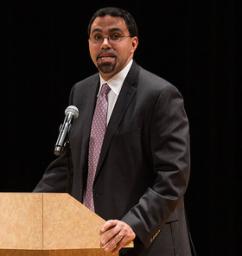Education Dept. warns against unequal gender access to CTE programs

The Department of Education on Wednesday released a Dear Colleague letter warning high schools and colleges that women must have equal access to career and technical education programs in order to fill jobs that are currently in high demand.
The letter also reminds educational institutions that, while they may not discriminate against students based on sex, they can still take proactive steps to increase enrollment for underrepresented groups.
“As the father of two daughters, I want my girls – and all young women in this country – to have access to the careers of their dreams, no matter the path,” Education Secretary John King said in a statement. “Career and technical education is not just about preparing some students for successful lives and careers, it’s about giving all students the tools to succeed.”
The release of the letter coincided with the White House’s United State of Women Summit, where King made remarks about getting more females involved in CTE programs.
The agency goes on to state that high schools and universities must conduct their CTE admission, recruitment and counseling practices in a nondiscriminatory manner, and address persisting gender stereotypes in technical programs.
“Recipients may also want to keep in mind that decisions about course offerings, when based on sex stereotypes, can contribute to disproportionate access to CTE programs that lead to high-skill, high-wage and high-demand jobs,” the letter reads.
Officials argue that expanding participation of both men and women in school can lead to more skilled workers in fields like information technology, computer science, cybersecurity and advanced manufacturing, where women are historically underrepresented.
The letter cites the Carl D. Perkins Career and Technical Education Act, which requires states to meet certain targets for participation and completion rates of males and females in programs that they typically would not be enrolled in.
“We anticipate that this guidance will improve equitable access, participation, completion and post-program outcomes in CTE by discouraging discriminatory practices and encouraging school communities to take proactive steps to expand participation of students in nontraditional fields, and thus expand both access to and success in high-growth fields for both men and women,” said Johan Uvin, acting assistant secretary for Career, Technical, and Adult Education.
Uvin added that the same goes for selecting students based on race, ethnicity, English language status and disability.
Taking a step further, the department’s Office of Career, Technical, and Adult Education is developing an “advancing equity in CTE” toolkit, which will provide resources and strategies to implement equitable and high-quality CTE programs in secondary and postsecondary institutions.
Reach the reporter at corinne.lestch@edscoop.com and follow her on Twitter @clestch and @edscoop_news.




